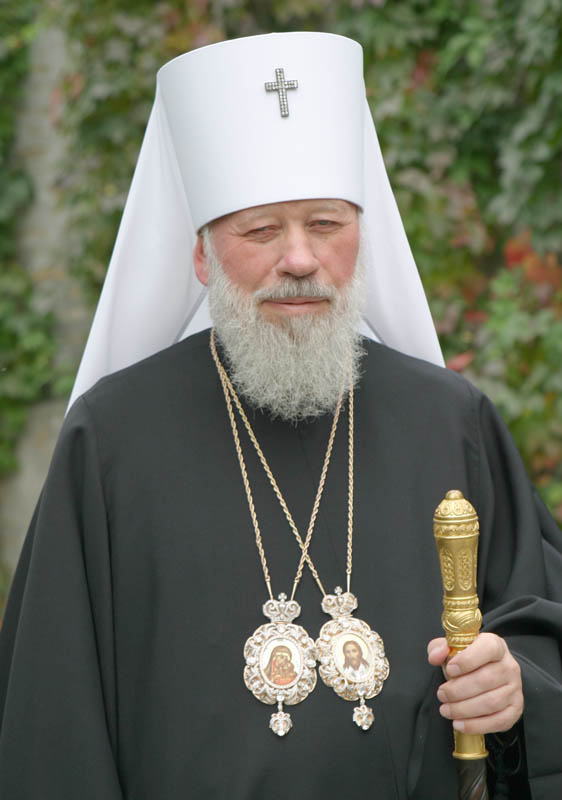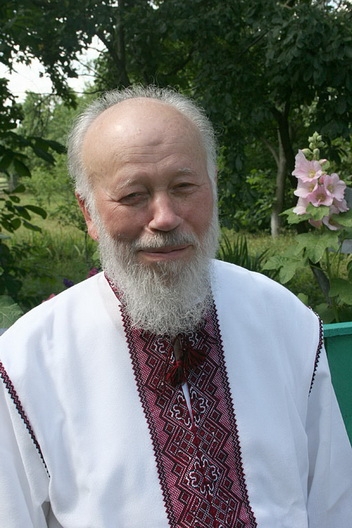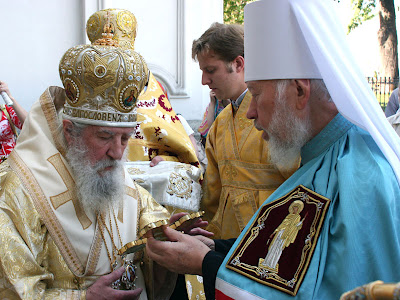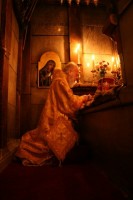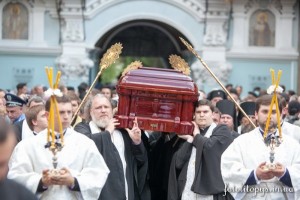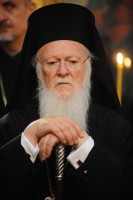An epoch is a period of time, the beginning of which is associated with a significant event that changed the future course of history, or a period of time associated with an outstanding person who influenced the course of history. Therefore, the period of life of the Ukrainian Orthodox Church beginning with the historic Council of Kharkov and continuing until the present day can without exaggeration be called an epoch.
The beginning of the 1990s was a time of rebirth for the Church, a time of the emergence of faith from the underground and the beginning of a second Baptism of Rus’. During these years the spirit of this age also penetrated the church environment, sowing division and engendering schisms. It was to overcome this division and preserve the unity of the Church that a Council of Bishops of the Ukrainian Orthodox Church was convened on May 27, 1992, in Kharkov. It was at this Council that His Beatitude, Metropolitan Vladimir, was elected as Primate.
In the twenty years that have since passed, the Ukrainian Orthodox Church under the omophorion of His Beatitude, Metropolitan Vladimir of Kiev and All Ukraine, has not only preserved its unity, but has grown significantly, both quantitatively and qualitatively.
In 1992, the Ukrainian Orthodox Church has eleven dioceses and twenty bishops. Now our Church has forty-five dioceses and seventy-four bishops. In 1992, there were approximately 5,000 parishes in the Ukrainian Orthodox Church. Now there are more than 12,500. In 1992, the Ukrainian Orthodox Church had twenty-eight monasteries and convents; today there are more than 200.
According to the charter of His Holiness, the Patriarch of Moscow and All Russia, the Ukrainian Orthodox Church is independent and autonomous in its administration. This status has been confirmed by the Local Council of the Russian Orthodox Church, the Council of the Ukrainian Orthodox Church, and also by our Church’s experience under the difficult conditions of the past twenty years. It is precisely this status that enables our Church to preserve unity with the Universal Church and all the Orthodox Churches in the world, as well as to preserve the unity of the Russian Orthodox Church and the inner unity of the Ukrainian Orthodox Church. Thanks to this very status, the Ukrainian Orthodox Church can become the foundation for restoring the unity of all Ukrainian Orthodoxy.
The Ukrainian Orthodox Church is part of the Orthodox world, of the One, Holy, Catholic, and Apostolic Church of Christ. This unity is confirmed and constantly maintained through the brotherly and Eucharistic fellowship of His Beatitude, Metropolitan Vladimir of Kiev and All Ukraine, with the Primates of the Local Orthodox Churches.
His Beatitude, Metropolitan Vladimir, is a tireless pilgrim. It would be hard to count how many times he has visited the Holy Land, how many times he has prayed at the Holy Sepulcher for our Church, our country, and our God-loving Ukrainian people. Thanks to His Beatitude and the multitude of Ukrainian pilgrims, Ukraine is known as a country of faithful people who show reverence for the sacred. But Ukraine is also a place to which pilgrims and worshippers stream from all corners of the Christian world. Every year His Holiness, Patriarch Kirill of Moscow and All Russia, Primate of the Russian Orthodox Church, visits Kiev, the mother of Russian cities.
Over the past twenty years, Primates and representatives of all the Local Orthodox Churches of the world have visited the Ukrainian Orthodox Church. These have included His Blessedness, Patriarch Theophilos of the Holy City of Jerusalem and All Palestine, who participated in an interfaith forum in Kiev; His Holiness, Patriarch Bartholomew of Constantinople, who visited Ukraine by invitation of the President; and His Holiness and Beatitude, Catholicos-Patriarch Ilia of All Georgia, who took part in the celebration of the Day of Baptism of Kievan Rus’.
Every year on this day – the feast day of the Holy Prince Vladimir, Equal-to-the Apostles and Baptizer of Rus’ – dozens of bishops, hundreds of priests, and thousands of faithful gather for divine services at the Kiev-Caves Lavra to bear witness to their unity in Christ and fidelity to Orthodoxy, as well as to congratulate the Primate of the Ukrainian Orthodox Church, His Beatitude, Metropolitan Vladimir of Kiev and All Ukraine, on the occasion of his name-day.
In 1992, the first act of the newly-elected Primate of the Ukrainian Orthodox Church, His Beatitude, Metropolitan Vladimir, was the translation of the relics and glorification of his predecessor on the See of Kiev, Metropolitan Vladimir (Bogoyavlensky) of Kiev and Gallich, the first New Martyr of the twentieth century, shot by the Bolsheviks in 1918.
From that time until the present, the Holy Synod of the Ukrainian Orthodox Church has glorified 260 strugglers of piety into the ranks of saints, including the Holy Hierarchs Peter Mogila and Luke (Voyno-Yasenetsky), Philaret (Gumilevsky) and Innocent (Borisov); the Venerable Laurence of Chernigov and Amphilochius of Pochaev, John of Svyatogorsk and Jonah of Kiev; the Venerable Anastasia of Kiev and Helen of Florovsk. There has also been the restoration of the church-wide veneration of the Right-Believing Prince Yaroslav the Wise and the establishment of synaxes of local saints and new martyrs of the twentieth century.
Evidence of the grace-filled renewal of the spiritual life of our people can be seen in the many manifestations of God’s mercy and in the appearance of miraculous icons of the Savior and our Most Holy Lady Theotokos. Newly-manifest icons have served as inexhaustible sources of grace and spiritual consolation, such as the “Look Down Upon the Humble” Icon of the Mother of God in Kiev, the weeping Boiany Icon of the Theotokos in Bukovina, the Svyatogorsk Icon of the Most Holy Virgin in the Donbass, and many others.
It goes without saying that the past two decades will go down in history as those of the recovery of thousands of churches and monasteries from ruins. During these years the greatest holy places of our Church and people have been restored, among which was the Dormition Cathedral of the Kiev-Caves Lavra, blown up during the Great Patriotic War [WWII]. The entire Lavra has been transfigured, with the churches and buildings gradually restored. Now it has become a place of pilgrimage for millions of Orthodox Christians from the entire world, as well as a flourishing garden in the midst of a metropolis of many millions.
The St. Vladimir Cathedral in Chersonese, built on the location of the Baptism of Prince Vladimir the Equal-to-the-Apostles and Baptizer of Rus’, was likewise restored; the ancient Svyatogorsk Monastery on the banks of the Seversky Donets River was also restored and given the status of Lavra, with all its churches and unique chalk caves renovated.
Alongside the restoration of holy places desecrated by the God-fighting regime, the Ukrainian Orthodox Church is actively building new churches and monasteries in every city and village of Ukraine. Throughout all these years the Primate of the Ukrainian Orthodox Church, His Beatitude, Metropolitan Vladimir, has performed foundation-layings and consecrations of churches practically on a daily basis.
One church deserves special mention. In 2007, the Holy Synod of the Ukrainian Orthodox Church resolved to build a new cathedral in Kiev in honor of Christ’s Resurrection and, along with it, the spiritual and educational center of the Ukrainian Orthodox Church. This cathedral will become the Sophia of Kiev of the twenty-first century, while the modern church infrastructure will help develop the social services needed by our society today.
Freed from the yoke of atheism, the Ukrainian Orthodox Church has revived the service to neighbor commanded it by God. Clergy of our Church and Orthodox volunteers visit hospitals, orphanages, and nursing homes, as well as the elderly and those with special needs. Church philanthropy and social service is being reborn. Churches and prayer rooms have been opened in prisons and military units.
One area of priority has been youth work and the youth volunteer movement. The Orthodox youth, the future of our Church, are not indifferent. The issues of strengthening the family, the upbringing of children, and the maintaining of morality in society have also come to the fore.
For seventy years our Church was deprived of the right to preach, as well as of the opportunity to engage in educational and missionary activity. Over the course of the past twenty years a system of theological education and clergy training has been revived. In 1992, the Ukrainian Orthodox Church had one theological academy and three seminaries. Now it has twenty institutions of theological learning with more than 3,000 students.
Practically every church has a Sunday school and catechetical talks for parishioners, as well as for those desiring to have their children Baptized or to be married in church. The teaching of the foundations of Christian ethics and the foundations of Orthodox culture is spreading in Ukraine’s secondary schools. Theological faculties are opening in institutions of higher learning and the process of acquiring state recognition for theological education is underway.
The Church is also developing its missionary and educational ministry with the help of means of mass information and communication. In 1992, the Ukrainian Orthodox Church had only one newspaper, while today there are more than 400 mediums of mass communication. The Church creates and develops its own television and radio programs, periodicals, and Internet sites. The Church publishes and distributes thousands of copies of Holy Scripture, the Law of God, and theological and educational literature.
The voice of the Church is heard on the air on central and regional television and radio stations and from the pages of leading newspapers and magazines. Naturally, the main newsmaker and spokesman of the Ukrainian Orthodox Church is His Beatitude, Metropolitan Vladimir, who is always ready to respond with meekness and humility to any journalist asking for a reason of hope [cf. 1 Peter 3:15].
The past twenty years have been only one part of the life’s path of His Beatitude, Metropolitan Vladimir, who last year celebrated his seventy-fifth birthday and the forty-fifth anniversary of his episcopal consecration and, in June of this year, the fiftieth anniversary of his ordination to the diaconate and priesthood.
Twenty years of primatial ministry is certainly an occasion to take stock and look back at the road traveled. But this is not yet the end of the present period of the Ukrainian Orthodox Church’s life under the omophorion of His Beatitude, Metropolitan Vladimir of Kiev and All Ukraine.
Many Years, Your Beatitude, our lord and father!
Prepared by the Synodal Information Department of the Ukrainian Orthodox Church for a documentary film dedicated to His Beatitude’s twenty years of primatial ministry.
Translated from the Russian












